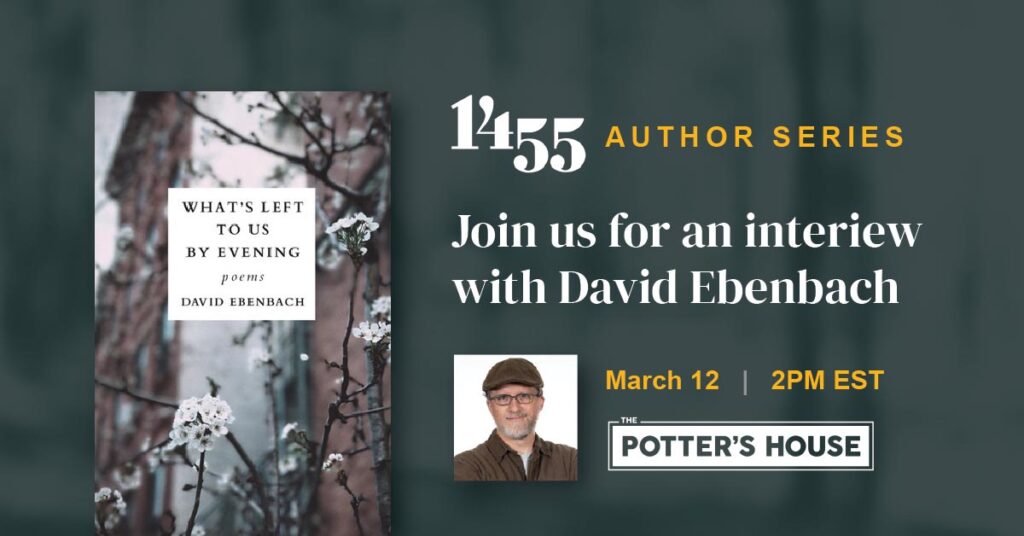
An unusually cold, blustery March day did not stop us from enjoying a fantastic conversation with master storyteller David Ebenbach. As always, our friends at D.C.’s Potter’s House were perfect hosts, and 1455 thanks them and everyone who joined us last Sunday!
I endorse Matthew Olzmann’s back-of-book blurb, where he writes “behind the world’s tough machinery is an undeniable beauty.” This tension, the push-and-pull of stopping to smell the proverbial roses and lamenting how briefly their color our world, seems to be a through line in this work. One of the many things I admire about this collection is—and there’s no non-pretentious way to put this—it ably represents the form of poetry. That is to say, the power of observation, and what I’d say is the poetic imperative of being incapable of noticing one thing without immediately thinking about cause and effect. For instance, a blooming flower but what about the inevitability of death? It seems to me there’s a keen sense of appreciating, even accepting the inevitable in these poems. In addition, this collection captures the dread and tension of the pandemic and the 2020 election; this grounds some of these poems in a time and place, but in many ways we’ve—infuriatingly—not felt much relief, or else our eternal present tense being filled with angst is the new normal.
1455 was honored to feature some of these poems in Issue 13 of Movable Type. One of them, which I happen to think succinctly distills many of this collection’s themes and concerns, is “Saturday Morning.”
Despite everything, sun finds the synagogue window.
Despite everything, stretches into the sanctuary—
whitening the white walls, polishing the wood floors,
touching shoulders and hair with warm hands—
finds us gathered from our many daily exiles,
already singing.
David, in addition to being a wonderful poet, is a masterful novelist, accomplished writer of short fiction, and a devoted teacher. More, he’s an active and enthusiastic literary citizen, and it’s 1455’s pleasure to celebrate him as such. Please enjoy –and share– the recorded video below to hear more about all these topics!
It’s our pleasure to partner with D.C.’s historic Potter’s House and we encourage you to pick up your copies of What’s Left to us By Evening from them and help support independent booksellers!

ABOUT THE BOOK:
How does one live in a world that is both beautiful and broken―a world of cherry blossoms and gun violence, fellowship and political enmity, plague and rebirth? What’s Left to Us by Evening, David Ebenbach’s unsparing and timely new poetry collection, examines the obligation―and privilege―of carrying all these things. The wide-ranging influences on the poems in Ebenbach’s third collection include Judaism, the Asian poetic tradition, the natural and built environments, and current events.
ABOUT THE AUTHOR:
David Ebenbach is the author of nine books of fiction, poetry, and non-fiction, and his work has picked up awards along the way: the Drue Heinz Literature Prize, the Juniper Prize, the Patricia Bibby Award, and more. Born and raised in the great city of Philadelphia, these days David does most of his writing in Washington, DC, where he lives with his family—and where he works at Georgetown University, promoting inclusive, student-centered teaching at the Center for New Designs in Learning and Scholarship, and teaching creative writing and literature at the Center for Jewish Civilization and creativity through the Master’s in Learning, Design, and Technology Program.

